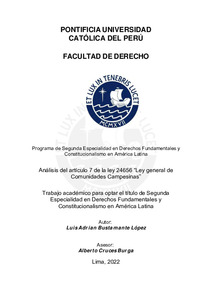| dc.contributor.advisor | Cruces Burga, Alberto | |
| dc.contributor.author | Bustamante López, Luis Adrian | |
| dc.date.accessioned | 2023-07-10T20:06:57Z | |
| dc.date.available | 2023-07-10T20:06:57Z | |
| dc.date.created | 2022 | |
| dc.date.issued | 2023-07-10 | |
| dc.identifier.uri | http://hdl.handle.net/20.500.12404/25340 | |
| dc.description.abstract | El trabajo aborda la problemática en torno al tratamiento que da el artículo 7 de
la ley 24656, “ley general de comunidades campesinas”, en sostiene la
inembargabilidad de la propiedad del territorio comunal. Se propone una
analisis desde una perspectiva historica y de estanadres interamericanos sobre
la propiedad comunal, para al final hacer una breve conclusión de porqué se
trataria de una medida con un corte paternalista, y de paso, la implicancia que
esta medida tiene con las comunidades campesinas, quienes se ven privadas
de acceder a los sistemas bancarios y crediticios, debido a que no pueden
contar con su mayor activo como garantía de los prestamos.
En ese sentido, tambien se hace una recopilación de sentencias de la corte
interamericana sobre la propiedad comunal e indígena, y se plantean los
estanadares actuales de derechos humanos sobre el mencionado derecho. De
la misma manera, se plantea y se desarrolla brevemente el concepto del
paternalismo “fuerte” y el paternalismo “libertario”, para de esta manera, pasar
al analisis concreto del artículo en cuestión y plantear sugerencias y las
conclusiones de la formulación del mismo. | es_ES |
| dc.description.abstract | The paper deals with the problem of the treatment given by article 7 of law
24656, "general law of peasant communities", in support of the unseizability of
the communal territory property. An analysis is proposed from a historical
perspective and from the perspective of inter-American standards on communal
property, in order to make a brief conclusion as to why it is a paternalistic
measure, and the implications that this measure has on the peasant communities, who are deprived of access to the banking and credit systems,
because they cannot count on their greatest asset as collateral for loans.
In this sense, a compilation of judgments of the Inter-American Court on
communal and indigenous property is also made, and the current human rights
standards on this right are discussed. In the same way, the concept of "strong"
paternalism and "libertarian" paternalism is presented and briefly developed, in
order to move on to the concrete analysis of the article in question and to
present suggestions and conclusions of its formulation. | es_ES |
| dc.description.uri | Trabajo académico | |
| dc.language.iso | spa | es_ES |
| dc.publisher | Pontificia Universidad Católica del Perú | |
| dc.rights | info:eu-repo/semantics/openAccess | es_ES |
| dc.rights.uri | http://creativecommons.org/licenses/by-nc/2.5/pe/ | * |
| dc.subject | Comunidades campesinas--Legislación--Perú | es_ES |
| dc.subject | Comunidades campesinas--Tenencia de la tierra | es_ES |
| dc.subject | Bienes públicos--Perú--Protección | es_ES |
| dc.title | Análisis del artículo 7 de la ley 24656 “Ley general de Comunidades Campesinas” | es_ES |
| dc.type | info:eu-repo/semantics/bachelorThesis | es_ES |
| thesis.degree.name | Segunda Especialidad en Derechos Fundamentales y Constitucionalismo en América Latina | es_ES |
| thesis.degree.level | Título Profesional | es_ES |
| thesis.degree.grantor | Pontificia Universidad Católica del Perú. Facultad de Derecho | es_ES |
| thesis.degree.discipline | Derechos Fundamentales y Constitucionalismo en América Latina | es_ES |
| renati.advisor.dni | 44157341 | |
| renati.advisor.orcid | https://orcid.org/0000-0003-1871-9606 | es_ES |
| renati.author.dni | 71471472 | |
| renati.discipline | 421189 | es_ES |
| renati.level | https://purl.org/pe-repo/renati/level#tituloSegundaEspecialidad | es_ES |
| renati.type | https://purl.org/pe-repo/renati/type#trabajoAcademico | es_ES |
| dc.publisher.country | PE | es_ES |
| dc.subject.ocde | https://purl.org/pe-repo/ocde/ford#5.05.01 | es_ES |







